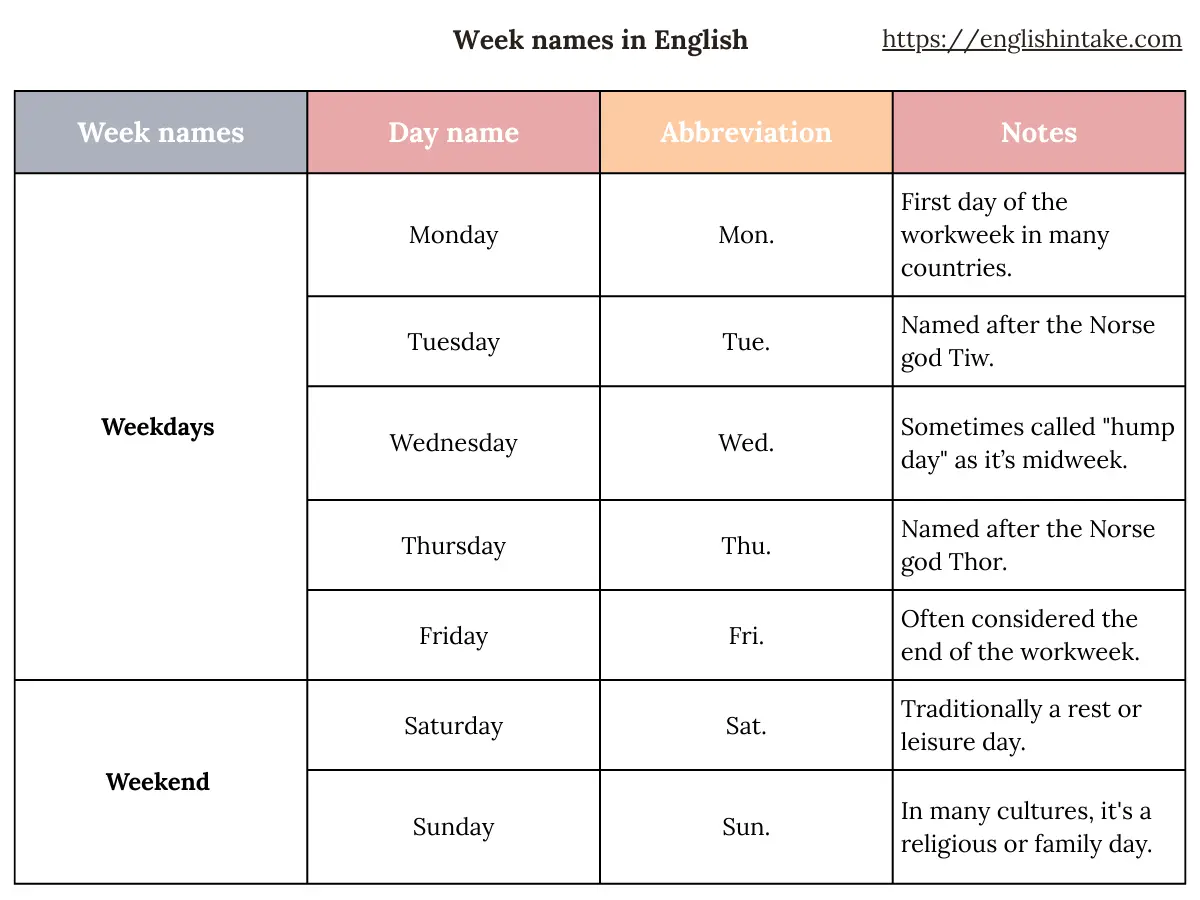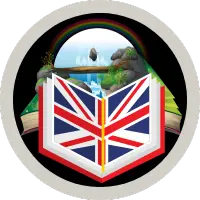1. Names of the days of the week
In English, a week has seven days. The week names include five weekdays and two weekend days. Most people work or go to school on weekdays but relax or do fun activities on the weekend.
1.1 Weekdays
- Monday
- Tuesday
- Wednesday
- Thursday
- Friday
1.2 Weekend
- Saturday
- Sunday
A calendar week is a period of seven days. It usually starts on Sunday or Monday, depending on the country. Many countries follow the ISO 8601 rule, where the week starts on Monday and ends on Sunday. Four weeks and a few days make up a month, and 12 months make up a year.
Each year has 52 or 53 weeks, depending on how the days fall. The first week of the year must have at least four days in January to keep the system clear.
| Week names | Days of the week | Abbreviations |
|---|---|---|
|
Weekdays
|
Monday | Mon. |
| Tuesday | Tue. | |
| Wednesday | Wed. | |
| Thursday | Thu. | |
| Friday | Fri. | |
|
Weekend
|
Saturday | Sat. |
| Sunday | Sun. |
2. Origins
Monday is named after the Moon. The old English word for Monday was Monandæg, which means "Moon’s day."
Tuesday comes from Tiw’s day. Tiw, or Tyr, was a Norse god of war, similar to the Roman god Mars.
Wednesday is named after Odin, who was a major Norse god. The name comes from Woden's day.
Thursday is named after Thor, the Norse god of thunder. So, it’s Thor’s day!
Friday comes from Frigg’s day. Frigg was a Norse goddess linked to love and beauty.
Saturday is the only day of the week to retain its Roman origin in English, Saturday means Saturn’s day, after the Roman god of wealth and time.
Sunday is named after the Sun. Like Monday, its name comes from Old English, Sunnandæg, meaning "Sun’s day."
3. How to ask for the days of the week in English?
To ask for the days of the week in English, you could say: What date is today? The answer would be: Today is . Or It's .
Are week names capitalised in English? Yes, the days of the week are proper nouns and must begin with capital letters.
- Today is .
- Yesterday was .
- The day before yesterday was .
- Tomorrow is .
- The day after tomorrow is .
4. Common English words and expressions
weekdaysthe days from Monday to Friday.
People work on weekdays.
weekendsrefer to Saturday and Sunday.
People do not usually work on weekends.
todaythe current day.
What are you doing today?
tomorrowthe day after today.
I’m going to Paris tomorrow.
yesterdaythe day before today.
I saw your girlfriend yesterday.
a day offa day when you take a break from work.
I’m taking two days off next week.
a sick daya day when you do not work because of illness.
I’m not feeling well. I’m going to take a sick day today.
call it a dayto stop doing something for the rest of the day because you do not want to do it anymore or you think you have done enough.
I think we've done enough for today. Let’s call it a day.
save the dayprevent a bad situation from happening, and save someone from trouble.
I was about to be robbed at gunpoint when the police came and saved the day.
back in the daya point of time in the past.
I remember back in the day when there was no internet, we used to hang out with friends, play the guitar and sing together.
not be someone’s dayan unlucky day for someone.
Today is not my day. Everything went wrong for me. I had a flat tire, so I was late for my interview and didn't get my dream job.
weeklyevery week.
My doctors advised me to do enough weekly exercise to stay healthy.
dailyevery day.
Is exercise part of your daily routine?
in a weekafter about seven days.
I hope to get this report done in a week.

